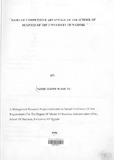| dc.description.abstract | The major purposes of this study were to document the bases of competitive advantage of the
University of Nairobi's school of business and the extent to which the school of business has
reflected these bases of competitive advantage in its current strategic plan. This was a case study
and descriptive statistics was used in the analysis to display data in frequencies tables. Mean
Scores and Standard Deviation were also computed.
In the conclusion, the results from data analysis and findings of the research imply that building
university name identification and ensuring major effort to insure adequate courses availability
create very important bases of competitive advantage which leads to high credibility and increase
in revenue into the school of business. Results from the study imply that the least important
bases of competitive advantage and the barriers that have impacted on the progress of sustainable
competitive advantage initiatives in the school must be reviewed to remove hindrances to
successful implementation to ensure potential increase in competitive advantage hence expansion
of the school of business to met acceptable world standards and ensure there is no decline in
potential profit growth over time.
Secondly, the major barriers that have impacted on the progress of sustainable competitive
advantage initiatives in the school are resistance to change, organizational structure and lack of
funding, lack of support from university administrators, lack of data access and lack of
interdisciplinary research.
Lastly, the bases of competitive advantage that have been reflected on the school's and the
university of Nairobi's strategic plans as a whole, so as to remain competitive and effectively
differentiate themselves from other schools and institutions of higher learning, and the responses
were: building university name identification in the current strategic plan, developing and
refining existing service/product offerings, broad service/product range, new
service/product/degree development, major effort to insure adequate courses availability, strong
branch/campus network, specific efforts to insure a pool of highly trained/experienced personnel,
concerted effort to build the organization's reputation within the industry, and following the
actions of competitors. Indeed the current strategic plan meets the dimensions of what a strategic
plan should be, covering all the strategic variables.
The following recommendations were also made to the school of business' management staff:
that they should change the culture of status quo, restructure their operations and way of doing
things, seek other sources of funding to run their projects and operations, emphasize support
from university administrators, create awareness, interest, and involvement of everybody in the
strategic planning process, ensure efficient data access and interdisciplinary research and
emphasize the issues of training and set achievable/clear performance indicators. The only
limitation was time and financial constraints in carrying out the research | en |

